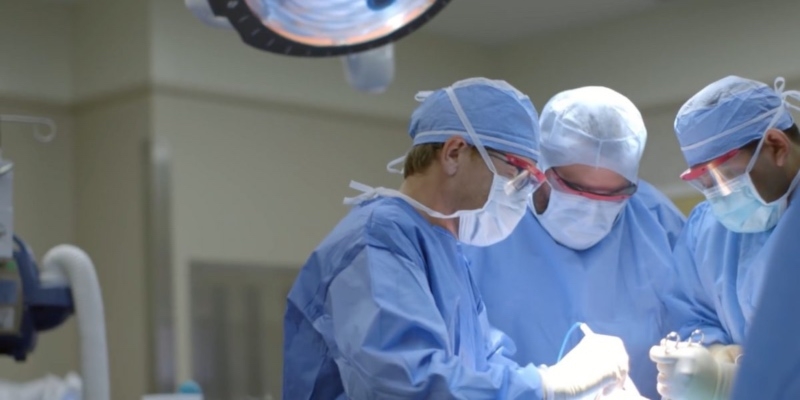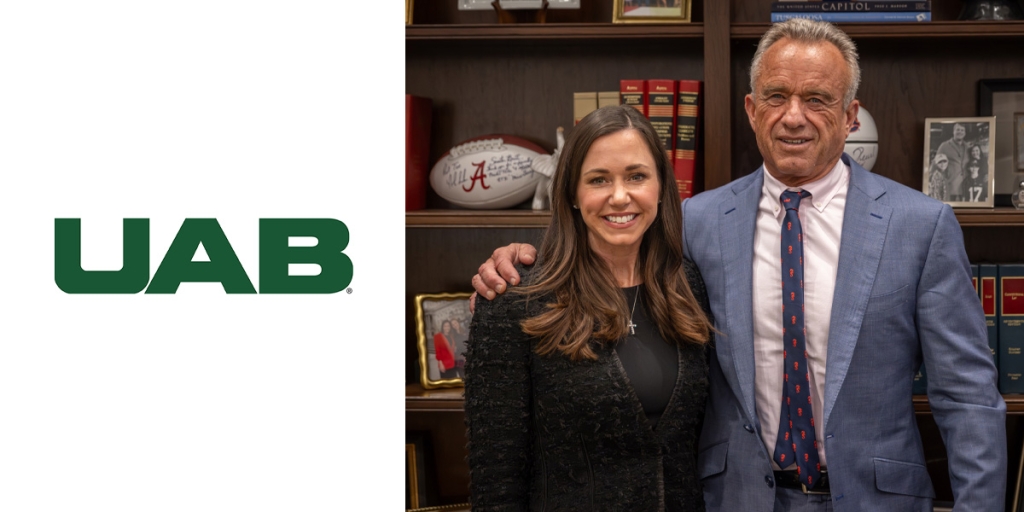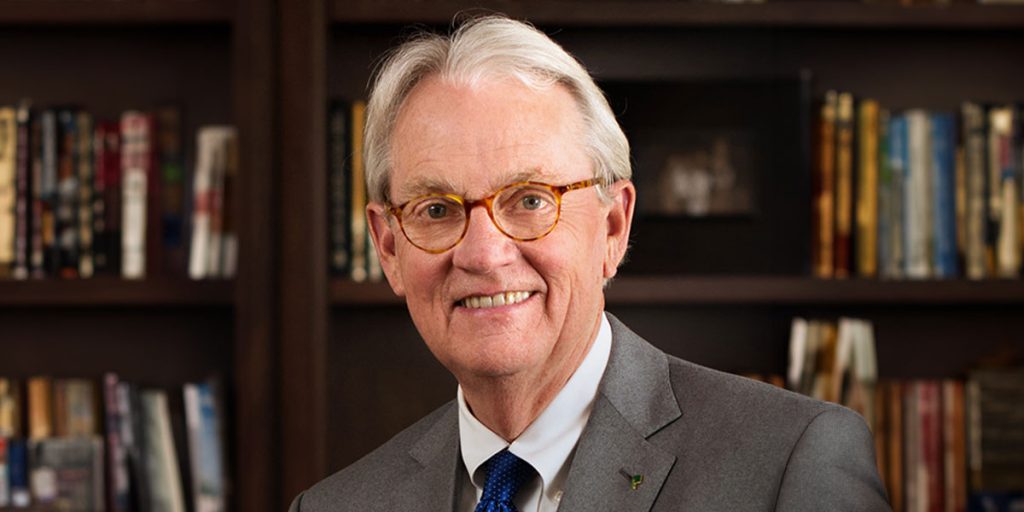In Alabama’s rural communities, a health care crisis is spreading. Local hospitals are straining under economic pressures and slashing services to keep the doors open. In all but a handful of counties, there is a shortage of front-line doctors.
These problems are intensified by Alabama’s obesity rate and the fact that conditions such as diabetes and hypertension are more widespread across the state than in the nation as a whole.
For Alabama, health care ills have far-reaching consequences. Not only does the lack of medical care impact residents, but the situation also threatens to curb workforce growth and diminishes the state’s ability to attract new businesses and jobs.
To attack the problem, the University of Alabama at Birmingham and the University of Alabama have taken the offensive with a wide range of programs and initiatives.
They are providing medical education and training, assisting struggling hospitals with management expertise, developing sustainable health care models and deploying innovative technologies to benefit rural patients, along with much more.
Fess St. John, interim chancellor of the University of Alabama System, said it is critical that the UA System’s experts take the lead to identify ways to expand access to medical care across the state, particularly in rural areas.
“We don’t need to wake up one day where people in small counties or counties that don’t happen to be close to a big city don’t have a doctor or a hospital anymore,” St. John said. “Somebody needs to be thinking about that – and it needs to be the University of Alabama, UAB and our System.”
TRAINING RURAL PHYSICIANS
These efforts are essential because the shortage of rural physicians is expected to worsen as Alabama’s population ages, older physicians retire and fewer doctors choose to practice in Alabama’s small towns and rural communities.
In May 2018, UAB and Blue Cross Blue Shield of Alabama unveiled a partnership that calls for UAB to train 60 primary care physicians to work in underserved areas of the state. Blue Cross is giving $3.6 million to fund scholarships for UAB medical students over a five-year period.
After completing their residencies, these UAB-trained physicians will practice in an Alabama county with a primary care shortage for at least three years. The need is severe. By one measure, 62 of the state’s 67 counties need more front-line doctors.
“As someone originally from the small town of Demopolis in Marengo County, I’m especially excited that our expertly trained physicians will soon be serving in communities that need them so desperately,” said Dr. Selwyn Vickers, Senior Vice President for Medicine and Dean of the School of Medicine.
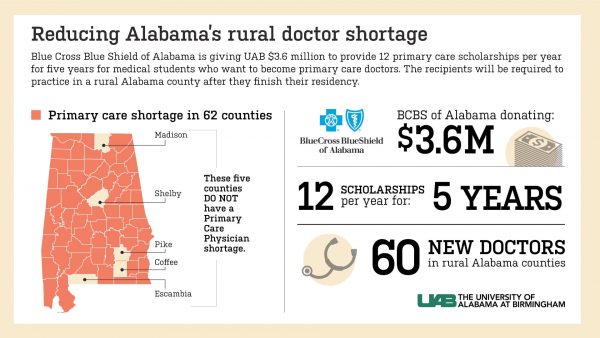
A significant UA initiative is the Rural Medical Scholars Program, which was established by the College of Community Health Sciences (CCHS) in 1996 to produce physicians for rural Alabama. The five-year medical education program includes a year of study after students receive their undergraduate degree and early admission to the School of Medicine.
The program has been cited nationally as a model initiative. To date, it has placed 71 physicians into practice in rural Alabama. Ten students were selected for the program’s 2018-19 academic year.
“Alabama is a disproportionately rural state, and medical education programs that develop rural physicians and other health professionals are vital,” said Dr. Richard Friend, the college’s interim Dean. “At CCHS, we have been and will continue to address these workforce needs. We are dedicated to rural health – it is a key part of our mission.”
ASSISTING RURAL HOSPITALS
UAB has been making a strategic push to help stabilize small hospitals across Alabama.
The UAB Health System has entered into management agreements with the J. Paul Jones Hospital in Camden and hospitals in Demopolis and Greenville, allowing them to benefit from UAB’s expertise and resources. Affiliate relationships are in place with hospitals in Florence, Anniston and Alexander City.
“Small hospitals, in particular those in Alabama’s underserved, rural counties, are under tremendous financial pressure,” said Dr. Will Ferniany, CEO of the UAB Health System. “We believe it is part of the UAB Medicine mission to help provide assistance to hospitals throughout the state and to do what we can to ensure the survival of these rural hospitals.”
The UAB Health System is also opening the Alabama Rural Hospital Resource Center to provide support for rural hospitals facing economic struggles. The center will help with purchasing, strategic planning, recruitment, compliance and other functions.
UA’s College of Community Health Sciences, meanwhile, has played a major role in keeping Pickens County healthier, thanks to an alliance formed after local officials sought help to keep their hospital in Carrollton open.
The University of Alabama-Pickens County Partnership, led by CCHS, has received a third year of state funding for ongoing and new initiatives to help improve health and well-being in the rural county.
Eleven projects that address county health issues were funded, and four recent UA graduates were hired for fellowships. The fellows, who will serve through May 2019, will implement programs and participate in seminars about health and public policy.
The partnership brings together Pickens County organizations and UA faculty and students to facilitate a sustainable model of health care delivery for the county. At the same time, it provides real-world training for UA students in medicine, nursing, social work, psychology, health education and other disciplines.
“Our College’s mission is to improve and promote the health of individuals and communities in Alabama and the region, and one of the ways we seek to do this is by engaging communities as partners, particularly in rural and underserved areas,” Dr. Friend said.
“Through this partnership, future physicians and other health care providers receive educational experiences and learning opportunities in communities, where most will practice, and we can work to sustain health care in communities that most need it.”
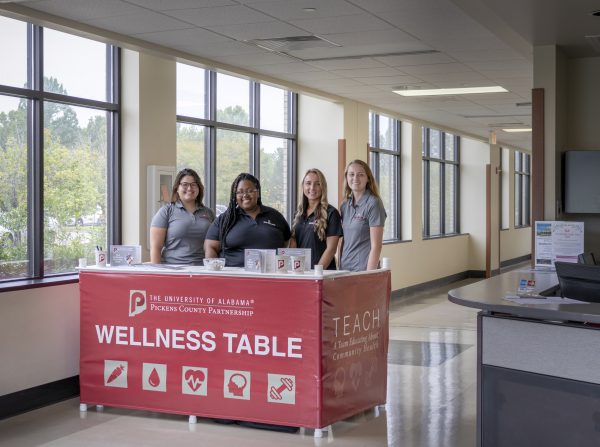
IMPROVING OUTCOMES
The universities have other programs in place to produce health care professionals for rural Alabama and improve health care delivery to people living in those areas.
Longstanding programs in the CCHS’ Rural Health Pipeline initiative have prepared high school juniors and seniors from rural areas for opportunities in the health care profession.
A new program at UA’s Capstone College of Nursing, BAMA-Care, will train 36 primary care nurse practitioners to work in rural and underserved areas of Alabama.
A key goal of BAMA-Care is to help close the gap between physical and mental health care access and rural Alabamians, according to Dr. Robin Lawson, senior associate dean for academic programs in the Capstone College of Nursing. The program is being funded with a $650,000 federal grant.
Technology is also figuring in efforts to improve outcomes for patients in rural Alabama.
Using a $500,000 federal grant, UAB is adding 19 new locations to its telehealth network so Alabama patients can meet with medical specialists without having to travel long distances. With the help of a nurse and video conferencing, patients are able to have a full checkup with their doctors closer to home.
UAB is also collaborating with Birmingham’s Lakeshore Rehabilitation Hospital on a telehealth rehab program targeting patients living in isolated areas. Plus, the university has explored using telehealth as a way to reach HIV-positive patients in rural Alabama.
Chancellor St. John said the sweeping range of these programs demonstrates the UA System’s deep commitment to improving health care outcomes across the state.
“We have a very robust rural medicine program both in Tuscaloosa and at UAB. We are mindful of the challenges,” he said. “It doesn’t do someone any good to have a doctor they can’t get to. We are working closely with rural hospitals and health care systems around the state to meet the challenges. It is integral to our mission. ”
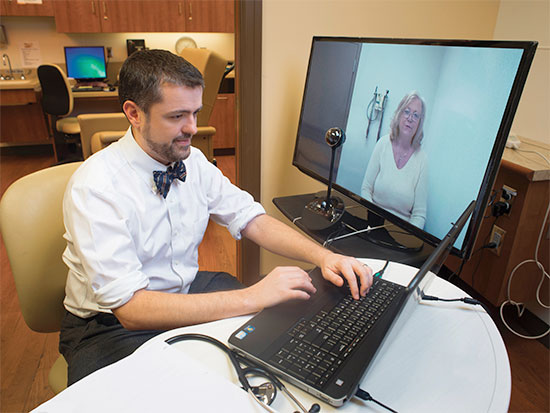
Republished courtesy of the University of Alabama System. For more stories like this, follow @UASystem on Twitter.
Comprising three of the most dynamic research universities in the South and a world-class medical center, The University of Alabama System is Alabama’s largest employer and a major driver for economic, intellectual, and cultural growth.




